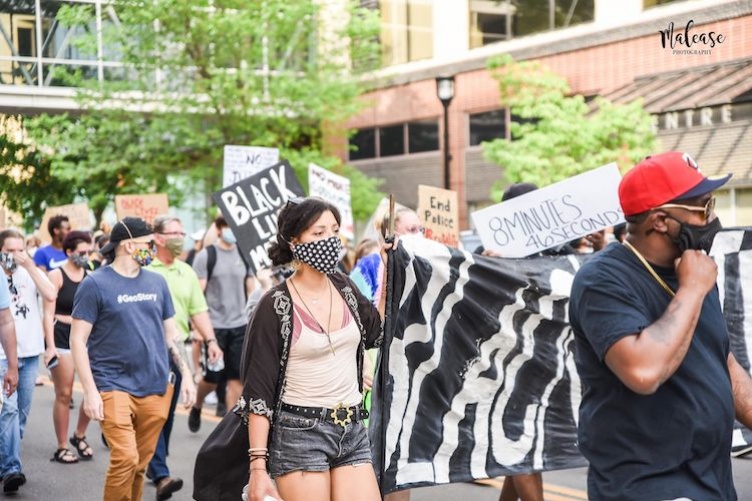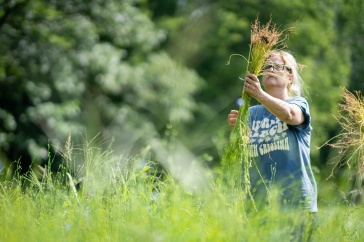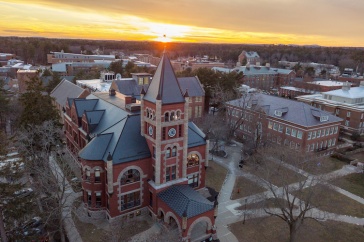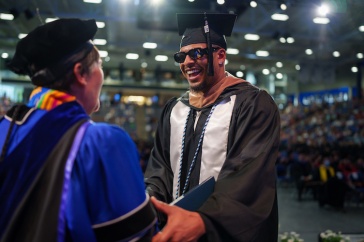
Tamara Marcus holds one side of a Black Lives Matter banner during a march in Cedar Rapids, Iowa, after the death of George Floyd.
Tamara Marcus knows that if there isn’t a way to address a problem, you find one.
A Ph.D. candidate at UNH, Marcus helped cofound the Advocates for Social Justice in Cedar Rapids, Iowa. The nonprofit was formed earlier this year in response to the death of George Floyd at the hands of police and shaped its goals around those of the Black Lives Matter (BLM) movement.
Marcus grew up in Cedar Rapids. Her grandparents had a farm in the eastern part of the state that is still in the family. Iowa is home. It is where she began vocally advocating for the rights of Black people.
“I had not been involved officially with the BLM movement before this year, though I have been verbally supportive of it. I think, like a lot of people, there were just too many incidents back to back and a then real opportunity to engage in the movement presented itself, so I jumped on it,” Marcus says. “I have not consistently lived in the United States for the last four years which has somewhat limited my ability to be involved with BLM in a meaningful way. Obviously, COVID changed things for me personally and I saw an opportunity to do the work I believe so desperately needs to be done, and so I took it.”
In June, the Advocates for Social Justice joined a local protest, marching with more than 2,000 people calling for change in light of Floyd’s death and those of other Black men and women whose deaths have been linked to excessive force by police.
"I saw an opportunity to do the work I believe so desperately needs to be done, and so I took it.”
Marcus and other members of the grassroots organization presented the Cedar Rapids City Council with a list of demands for police reform that included banning the use of chokeholds and knee-to-neck restraint, imposing the strict use of body cameras, making a significant investment in diversity, equity and inclusion, and establishing a citizen’s review board, among others.
“We set a deadline for Juneteenth for the City Council to agree to our demands. They convened a special meeting on June 19 where they unanimously agreed to meet them,” Marcus says. “Since our first protest we have had several more, all centered on continuing to demand reform within our local police department, and for our voices, Black voices, to be central in the reform process.”

Marcus says she didn’t always feel those voices were being heard when she first came to UNH, noting she had a number of experiences, especially during her first year, which “did not make me feel welcome, seen or heard.” This was during fall of 2016. But since then, she has witnessed more senior faculty — white faculty — showing greater interest in the issues of the diversity, equity and inclusion.
“To me that does indicate progress,” Marcus says. “But we must push that further, we owe that to the students of UNH and to the broader New Hampshire community. This is movement, not a moment and we can't stop now.”
Marcus is pursuing a Ph.D. in natural resources and Earth system sciences. Her focus is on microbial controls on methane emission from permafrost thaw in the Swedish Arctic. A former Fulbright-Nehru fellow with a bachelor’s degree from the University of Minnesota, her commitment to science communication was born when the U.S. withdrew from the Paris Agreement on climate change in 2017.
In 2019, along with fellow UNH grad student Drew Robison, she was selected as an ambassador for the Voices for Science program. That same year she received a $15,000 Switzer Fellowship, which offers one-year fellowships to 20 graduate students in New England and California whose studies and career goals are directed toward environmental improvement and who demonstrate leadership in their fields.
Recently Marcus was invited to join the diversity, equity and inclusion board in UNH’s Earth science department. “I hope to work alongside faculty and my peers to incite change within our department,” she says.
-
Written By:
Jody Record ’95 | Communications and Public Affairs | jody.record@unh.edu



















































